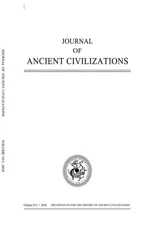Editors' Note
2018-01-23
The JOURNAL OF ANCIENT CIVILIZATIONS (JAC) is published annually in two fascicles by the Institute for the History of Ancient Civilizations (IHAC, Northeast Normal University, Changchun, Jilin Province, People's Republic of China).
The aim of JAC is to provide a forum for the discussion of various aspects of the cultural and historical processes in the Ancient Near Eastern and Mediterranean world,encompassing studies of individual civilizations as well as common elements, contacts and interactions among them (e.g. in such traditional fields as Assyriology, Hittitology,Egyptology, Classics, and Sinology among others). Hence, we publish the work of international scholars while also providing a showcase for the finest Chinese scholarship,and so welcome articles dealing with history, philology, art, archaeology and linguistics that are intended to illuminate the material culture and society of the Ancient Near East,the Mediterranean region, and ancient China. Articles discussing other cultures will be considered for publication only if they are clearly relevant to the ancient Mediterranean world, the Near East and China. Information about new discoveries and current scholarly events is also welcome. Publishers are encouraged to send review copies of books in the relevant fields.
JAC is a double blind peer-reviewed journal. All submitted articles are first carefully read by at least two editors of JAC, who will give a feedback to the author. Articles(excluding book reviews or research reports) are afterwards reviewed anonymously by at least two referees in the specific field, appointed by the editorial board. In cases where the reviewers recommend changes in the manuscript, authors are requested to revise their articles. From time to time, we will publish a list of the referees to make the double blind peer-review process transparent and comprehensible.
The guiding principle through this fascicle is the question of “transfer.” How can we render a grammatically difficult passage into modern languages without losing historical semantics (Gabor Zólyomi)? How can we prove knowledge transfer between different cultures (Victor Gysembergh)? And, to what extent are current studies of ancient legal systems considering the historical, socio-political, economic as well as religious and cultural context (Survey of Ancient Law)? Readers may find stimulating new answers but also new problems for further discussion and research.
All communications, manuscripts, disks and books for review should be sent to the Assistant Editor, Journal of Ancient Civilizations, Institute for the History of Ancient Civilizations, Northeast Normal University, 130024 Changchun, Jilin Province, People's Republic of China (e-mail: jac@nenu.edu.cn), or to the Executive Editor in Chief, Prof.Dr. Sven Günther, M.A. (e-mail: svenguenther@nenu.edu.cn or sveneca@aol.com).
